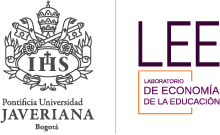LEE ENGLISH - NOTICIA: Recommendations to mitigate the effects of COVID-19 on Colombian education - LEE
Recommendations to mitigate the effects of COVID-19 on Colombian education
The shutdown of public schools for long periods increases school dropout rates, malnutrition, episodes of psychological and physical abuse at home, and, in general, social inequalities.
The Economics of Education Laboratory (LEE), together with the School of Economic and Administrative Sciences of the Universidad Javeriana, provide recommendations to address the negative effects of COVID-19 on Colombian education.
It is imperative that the National Government and local governments drive actions aimed at restoring all students' academic activities, ensuring effective teaching and learning processes and the well-being of students and teachers.
A decline of 0.13 and 0.10 standard deviations on the math and critical reading tests, respectively, is forecast for every 8 weeks of school missed for high school students on the Saber 11 test.
Bogotá, April 20, 2020 The team of the Economics of Education Laboratory (LEE), together with professors from the Economics Department of the Pontificia Universidad Javeriana, developed the document titled "Facts and recommendations to address the negative effects of COVID-19 on Colombian education", which provides recommendations for public education policy (short and long-term) to improve the quality of the country's public schools (and even some private schools), and their effective reaction to moments of crisis such as the one experienced at present due to the pandemic.
These recommendations are explained in the following 10 items, based on facts and figures about education in Colombia:
- Adjust the school year and academic leveling strategies.
- Allocate and provide access to technology tools.
- Create and adapt virtual platforms.
- Provide training and incentives for teachers.
- Create and disseminate educational material.
- Design prevention strategies.
- Care for nutrition, and mental and emotional health.
- Involve parents or caregivers in their children's learning process.
- Establish partnerships and regional meetings.
- Generate additional resources.
The authors state that the availability and good use of technology is key to counteract the consequences of school closures in education. They also highlight the importance of collective commitment: "not only of the national government and local governments but also of teachers, students, parents, entrepreneurs and, in general, all of Colombian society," says Luz Karime Abadía, Co-Director of the Economics of Education Laboratory (LEE).
You can read the complete document "Facts and recommendations to address the negative effects of COVID-19 on Colombian education” here.
You can also consult all the COVID-19 analysis documents of the School of Economic and Administrative Sciences by visiting the website: https://cea.javeriana.edu.co/analisis_econom_negocios




